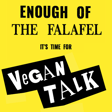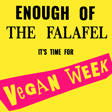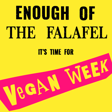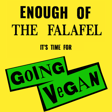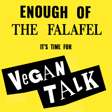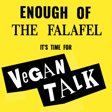
181- Fish feel pain...so let's...kill them quicker?!?!?!
...or how about DON'T KILL THEM AT ALL?!?!?!?! In a complete own-goal of a headline, a study released this week suggests that "humane slaughter" is the best solution to the findings showing just how much suffering is endured by suffocating fish. Where do we start?!?!
This week Kate & Ant look at this story, as well as eight other snippets from the last 7 days that have ramifications for animals and/or vegans in general.
****************
Enough of the Falafel is a community of people who love keeping on top of the latest news in the world of veganism & animal rights. With the Vegan Week podcast, we aim to keep listeners (& ourselves) informed & up-to-date with the latest developments that affect vegans & non-human animals; giving insight, whilst staying balanced; remaining true to our vegan ethics, whilst constantly seeking to grow & develop.
Each week we look through news stories from the past 7 days in the world of veganism & animal rights.
If you spot any news stories that might catch our fancy, or have an idea for a discussion topic, get in touch via enoughofthefalafel@gmail.com.
******************
This week's stories:
https://www.theguardian.com/environment/2025/jun/09/owl-sightings-increase-london-not-just-leafy-suburbs-aoe
https://plantbasednews.org/culture/film/new-horror-film-exposes-fishing-industry/ https://www.youtube.com/watch?v=nc73OVK_AuE (quite graphic)
https://www.bbc.co.uk/news/articles/cn4qp7nll22o#:~:text=A%20%C2%A3120m%20onshore%20salmon,basis%20of%20animal%20welfare%20concerns.
https://plantbasednews.org/lifestyle/health/more-artificial-ingredients-bread-vegan-meat/
https://www.youtube.com/watch?v=w81NRCt6Z2I
https://www.farminguk.com/news/new-tactics-unveiled-to-tackle-cabbage-stem-flea-beetle-crisis-in-osr_66714.html
https://www.earth.com/news/fish-like-rainbow-trout-suffer-extreme-pain-when-killed-by-air/
https://www.independent.co.uk/news/uk/home-news/vegetarian-power-meat-new-study-b2766387.html
https://pressat.co.uk/releases/animal-activist-groups-use-bully-tactics-once-again-111463870fd4992641ae5d00a5504732/
****************
Thanks everyone for listening; give us a rating and drop us a message to say "hi"; it'll make our day!
Kate & Ant
